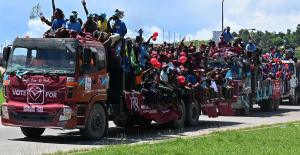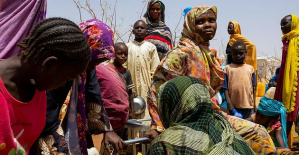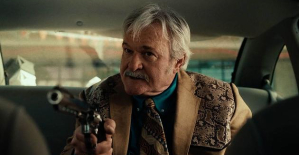Leonid, Viktor, Bogdan and Yaroslav, originally from northwestern Ukraine, joined the army on their own accord after the February 24 Russian invasion. The four men have been posted since the summer in the second line, four kilometers from the Russians, in case they break through the Ukrainian first line, in the Mykolaiv region (South).
Many similar units are scattered along the front, according to the military press attaché who accompanied AFP on Wednesday afternoon.
Their daily lives seem to be made up of waiting. At the bottom of a small hole, just wide enough for a man, a rocket launcher sits upright against a dirt wall. Several bottles of mosquito repellent left nearby testify to the inconvenience that nature inflicts on soldiers.
A few meters further, a machine gun is covered with a camouflage net, in front of cases of cartridges. Another hole, a few square meters, covered with logs, plastic and branches, can accommodate two men for the night.
On a southern front where heavy artillery combat largely decides the fate of the war, the four infantry soldiers listen to the shells pass, sometimes in the distance, sometimes very close, knowing that they could do nothing if one of them touched their position.
- 'Constant shelling' -
"For two hours there has been no bombardment. (...) But usually they are constant," said Bogdan, 29, a worker who had already enlisted in 2014 in the Ukrainian army, before returning to civilian life... to recently return to service.
"When you see a shell exploded 10-15 meters from you, it's scary. We are all human and we are all scared." And this father of two children to describe: "The earth trembles even when ours fire, and even more when they are the ones who bombard."
But despite the harshness of everyday life, "now it's better," he says. "We see that our comrades, our horde as we call them, are working. We see their successes and it inspires us. If some thought we weren't going fast enough, now that's not the case!"
At the end of August, kyiv announced a counter-offensive in the south, with the primary objective of retaking Kherson, a city populated by 280,000 inhabitants before the conflict, capital of the eponymous region, and neighboring that of Mykolaiv.
But after regaining a few villages and hamlets in the first two weeks, the advance struggled to materialize, while a similar move in the north resulted in resounding successes. The South has finally caught up in the past five days.
- 'Killing' the 'orcs' -
On Tuesday, Volodymyr Zelensky spoke of "rapid and powerful" progress, citing eight localities taken over in the Kherson region, which was confirmed by maps presented the same day by the Russian Ministry of Defense. On Wednesday, the Ukrainian president claimed the "liberation" of three new villages in the area.
The American Institute for the Study of War, an independent American research center, spoke on Thursday of "major gains" for kyiv in the past 48 hours in the north of the Kherson region.
After four months of battle, kyiv troops have notably reconquered Davydiv Brid, a small strategic village located on a river, which is about ten kilometers from the small trenches visited on Wednesday by AFP.
"The mood of the boys has changed. It has become much better," rejoices their commander Yaroslav, a sturdy 39-year-old man wearing a black cap. "There is light at the end of the tunnel."
Behind Davydiv Brid, there remains only a vast plain on which the "orcs", an insulting nickname given to the Russians, will have "nowhere to hide", he says. No matter their number, whereas according to Yaroslav, between 400 and 800 new Russian soldiers recently arrived as reinforcements in their area after the mobilization decided by Moscow.
"If we split their ranks, they will run away," exclaimed Leonid, 46, giving a thumbs up in victory. And to mock the new enemy recruits, whom he describes as "cannon fodder". To resume Kherson, "we will have to kill them, he says. There is no other solution."

 Knife attack in Australia: who are the two French heroes congratulated by Macron?
Knife attack in Australia: who are the two French heroes congratulated by Macron? Faced with an anxious Chinese student, Olaf Scholz assures that not everyone smokes cannabis in Germany
Faced with an anxious Chinese student, Olaf Scholz assures that not everyone smokes cannabis in Germany In the Solomon Islands, legislative elections crucial for security in the Pacific
In the Solomon Islands, legislative elections crucial for security in the Pacific Sudan ravaged by a year of war
Sudan ravaged by a year of war Covid-19: everything you need to know about the new vaccination campaign which is starting
Covid-19: everything you need to know about the new vaccination campaign which is starting The best laptops of the moment boast artificial intelligence
The best laptops of the moment boast artificial intelligence Amazon invests 700 million in robotizing its warehouses in Europe
Amazon invests 700 million in robotizing its warehouses in Europe Inflation rises to 3.2% in March due to gasoline and electricity bills
Inflation rises to 3.2% in March due to gasoline and electricity bills Olympic Games-2024: which professions are likely to strike during the competition?
Olympic Games-2024: which professions are likely to strike during the competition? Pizzas sold throughout France recalled for “possible presence” of glass debris
Pizzas sold throughout France recalled for “possible presence” of glass debris “As for a football player, there is a contract”: Carlos Tavares defends his remuneration of 36.5 million euros
“As for a football player, there is a contract”: Carlos Tavares defends his remuneration of 36.5 million euros Stellantis: shareholders validate the controversial remuneration of Carlos Tavares
Stellantis: shareholders validate the controversial remuneration of Carlos Tavares Dune 3 will be the last film of Denis Villeneuve's adaptation
Dune 3 will be the last film of Denis Villeneuve's adaptation Shane Atkinson, humble disciple of the Coen brothers
Shane Atkinson, humble disciple of the Coen brothers Outcry from publishers against the authorization of advertising for books on television
Outcry from publishers against the authorization of advertising for books on television Eddy de Pretto celebrates his “last party too many” at the Olympia
Eddy de Pretto celebrates his “last party too many” at the Olympia Skoda Kodiaq 2024: a 'beast' plug-in hybrid SUV
Skoda Kodiaq 2024: a 'beast' plug-in hybrid SUV Tesla launches a new Model Y with 600 km of autonomy at a "more accessible price"
Tesla launches a new Model Y with 600 km of autonomy at a "more accessible price" The 10 best-selling cars in March 2024 in Spain: sales fall due to Easter
The 10 best-selling cars in March 2024 in Spain: sales fall due to Easter A private jet company buys more than 100 flying cars
A private jet company buys more than 100 flying cars This is how housing prices have changed in Spain in the last decade
This is how housing prices have changed in Spain in the last decade The home mortgage firm drops 10% in January and interest soars to 3.46%
The home mortgage firm drops 10% in January and interest soars to 3.46% The jewel of the Rocío de Nagüeles urbanization: a dream villa in Marbella
The jewel of the Rocío de Nagüeles urbanization: a dream villa in Marbella Rental prices grow by 7.3% in February: where does it go up and where does it go down?
Rental prices grow by 7.3% in February: where does it go up and where does it go down? Europeans: the schedule of debates to follow between now and June 9
Europeans: the schedule of debates to follow between now and June 9 Europeans: “In France, there is a left and there is a right,” assures Bellamy
Europeans: “In France, there is a left and there is a right,” assures Bellamy During the night of the economy, the right points out the budgetary flaws of the macronie
During the night of the economy, the right points out the budgetary flaws of the macronie Europeans: Glucksmann denounces “Emmanuel Macron’s failure” in the face of Bardella’s success
Europeans: Glucksmann denounces “Emmanuel Macron’s failure” in the face of Bardella’s success These French cities that will boycott the World Cup in Qatar
These French cities that will boycott the World Cup in Qatar Dortmund-Atlético: two months before the Euro, Griezmann warms up the engine
Dortmund-Atlético: two months before the Euro, Griezmann warms up the engine Football: Bernd Hölzenbein, 1974 world champion, died at 78
Football: Bernd Hölzenbein, 1974 world champion, died at 78 'Everything comes to an end': Surfing legend Kelly Slater moves closer to retirement
'Everything comes to an end': Surfing legend Kelly Slater moves closer to retirement Athletics: the victory of a transgender athlete causes controversy in the United States
Athletics: the victory of a transgender athlete causes controversy in the United States


















